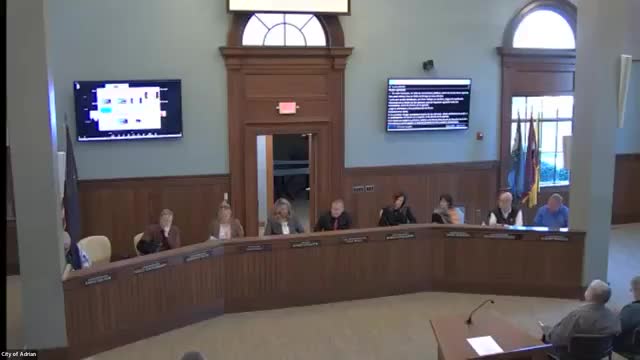Adrian police propose leased traffic-enforcement vehicle to target dangerous locations
Get AI-powered insights, summaries, and transcripts
Subscribe
Summary
Police Chief Vince Emmerich described recent pedestrian and bicyclist crashes and proposed a leased, low-profile traffic enforcement sedan funded from existing budget reserves; commissioners asked about enforcement limits, camera evidence and school-zone safety.
Chief Vince Emmerich, chief of police for the City of Adrian, told the Adrian City Commission on Oct. 20 that the department will reinstate a dedicated traffic-enforcement vehicle to focus on recurring crash locations and citizen complaints.
Emmerich said Michigan Office of Highway Safety Planning data and city crash mapping show an increase in serious crashes involving pedestrians and bicyclists and pointed to several local incidents, including recent fatalities and repeated crashes at the intersection of Main and Beecher. "If you're like me, it seems like people are driving a little crazier these days," he said, noting teen and distracted-driving trends the state office reported.
He said the department will lease a sedan configured for traffic enforcement rather than buy a marked front-line patrol vehicle. "We are going to be deploying a vehicle like that on all shifts along with our normal contingent of officers," Emmerich said. The vehicle will not be used as a regular radio-response unit; it will patrol mapped hot spots and locations flagged by public complaints. Emmerich said the outfitting cost will be minimal and come from budget reserves; the vehicle and equipment will be leased so the city may return it if the approach does not reduce crashes.
Commissioners and members of the public asked several operational questions. Commissioner Roberts asked whether radar-sign cameras capture license plates; Emmerich replied the department's radar sign has a camera but the images were low quality and could not reliably capture plates. "We could have a general idea, but not enough to follow through with an enforcement," he said, and added that officers have been dispatched to wait for repeat offenders identified by the sign.
Commissioner Miller and other commissioners raised school-zone concerns. Emmerich said complaints near elementary schools, the vocational-technical area and specific streets such as Mackenzie and South Center will be added to the vehicle's patrol schedule. He said officers will keep exercise discretion rather than adopt a zero-tolerance posture: "The goal is to change the behavior, so we're not intending on writing every person everything we can possibly find." He also said the vehicle will be used for community events, parades and outreach.
Emmerich described vehicle features: a lower-profile sedan (he said it will be a two-door Mustang in the proposed fit), interior-mounted light bars and the same municipal black-and-white striping; it will not include a prisoner divider. He said the vehicle may be pulled from service in inclement winter weather because it will be rear-wheel drive, and that the department will use Mobile Data Terminals and ticket printers inside the vehicle.
Emmerich said the Michigan State Police have expressed interest in providing some equipment assistance, which could reduce city costs. He also noted longer-term budget items including the upcoming Axon body-camera/taser contract renewal scheduled for 2027 and said the lease approach allows a lower up-front cost and flexibility.
Public commenters raised related concerns about nonautomobile traffic, including bicycles and motorized mobility devices; Gail Dunway urged attention to smaller vehicles and wheelchairs, noting they must obey traffic laws. The city administrator, Chad Baugh, introduced the chief's briefing and agreed to forward citizen complaints to the department for inclusion in enforcement planning.
The commission did not take formal action on the proposal at the meeting; Emmerich presented it as an operational plan to implement using existing budgeted funds and a lease arrangement. He said the department will proceed with deployment and return to commissioners for any needed follow-up.
